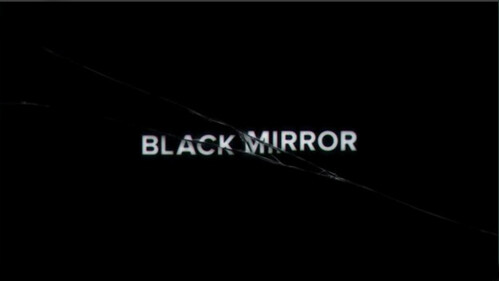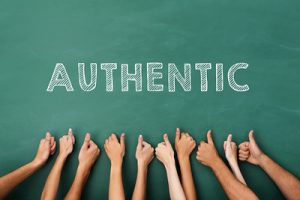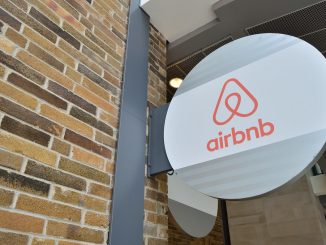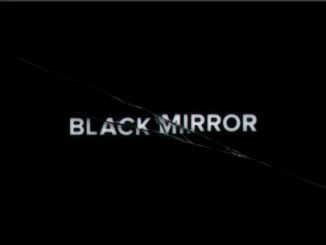
Bleak. The one word I think best describes the vision of the future portrayed in Fifteen Million Merits, the second episode of Black Mirror aired by Channel 4 and now available on Netflix. This description of bleak is par for the course for Black Mirror, which is an anthology series mostly exploring near-future dystopias, using technology to comment on contemporary social issues. This episode incorporates elements of dystopian fiction, science fiction, drama and offers commentary on capitalism. It also offers what I believe to be valuable commentary on the internet, specifically the growth of platforms and their practices.
Black Mirror – ‘Fifteen Million Merits’ Trailer (Unofficial) from Derek Pons on Vimeo.
Their world is a platform

The world our characters live in is the platform. Platforms are services which host, organise, and facilitate social exchanges but also, they are infrastructure beneath this (Gillespie, 2017). In this episode we see a literal “platform society”, not just a “platform society” as a concept to refer to the channelling of social, economic, and interpersonal traffic through systems using data and algorithms (van Dijck, 2018). Everywhere a character goes they are still using the same platform – the user interface and content is the same, characters have a profile that is used across every device we see, the avatars from their profiles is what they see when they communicate with each other and food and basic goods are also bought using this same system. Hence this place they live in is a platform as it facilitates their social exchanges and is the infrastructure behind all of it as well. Instead of multiple platforms competing or making use of each other we are shown a single platform dominating all aspects of society. From here onwards I refer to society the characters live in as “the platform”. This full domination is a monopoly, but even to the point that it seems a government does not exist. I believe that the world portrayed in this episode is one which follows a possible extreme outcome of DC’s commercial internet (O’Hara & Hall, 2018), we see a platform that is completely unregulated by any third party. The shows depiction is clearly a criticism of an unregulated internet where platforms are left to do as they please which they believe results in the change of life as we know it for a bleak and unfulfilling reality ruled by a single platform.
We work for free

Platforms exploit the labour of users to generate their profits. In the episode we see most characters cycling stationary bikes which earns them their in-world currency called “merits”. In this world the people clearly work for the platform to produce electricity and are rewarded with credits that can be used elsewhere on the platform. In a way this platform in the show is better than our current reality in which many of us are providing free labour to platforms. Many platforms make use of the free labour of users such as Reddit which encourages communities to have moderators – users who are responsible for ensuring posts in that community are according to their rules. In the show Bing questions the point of everything, he claims that everything they do has no value and that none of it is real. Just like him, questions have been raised throughout the years about the use of free labour on the internet. In the 90’s AOL chat hosts who had been always worked for free began to question whether they should be compensated even though they originally volunteered and enjoyed being chat hosts (Terranova, 2000). The question of people working for platforms continues today with questions over the gig economy that platforms such as Uber and Deliveroo make use of. Research suggests that gig economy workers feel trapped and need to spend more and more time on platforms to remain financially stable (Hern, 2020) . Just like in the show characters are shown spending all their time cycling for the platform, workers feel they need to be spending all their time on platforms today.
Platforms threaten us with invisibility
Platforms get users to participate through the threat of invisibility. In the show it seems characters have assigned bikes as it is always the same characters cycling next to each other, but in the beginning of the episode we see one character struggling to keep a pace similar to that of everyone else, and later we see he is no longer on his bike which now has someone new on it, the character Abi, and he is now a cleaner whom people mostly ignore and look down upon. This man is removed from the main area of the platform, and is left in the background, he is effectively been made invisible by the platform and to those he is visible to he is just another cleaner who is ridiculed and looked down upon. The platform has a system that encourages people to keep cycling and hence working for the platform through the threat of removal from the platform. The threat of invisibility due to less participation is seen in platforms today, although it is rather framed as visibility as a reward for participation (Bucher, 2012). In the case of Facebook, their EdgeRank algorithm will rank posts with more interaction from more people above other posts (Bucher, 2012). This creates an environment where users feel they must interact as much as they can to be seen on the platform. But why do users have a desire to be seen? So that they present themselves to their friends and, maintain and create social connections (Trottier, 2015). Just like in the show where people want to be visible and don’t want to be socially outcast so to do users of platforms now want to be visible and not be socially outcast and platforms prey on this behaviour to keep people interacting and producing profit for them.
This issue of authenticity

Everyone wants to a celebrity; everyone wants to be authentic. Mentioned before, a key story beat of the episode revolves around the talent show called “Hot Shot”. The idea is that anyone can perform, and the best get to become celebrities and live their lives in luxury. In reality we do have talent shows like these all over the world such as America’s Got Talent, X Factor, The Voice, etc. This pursuit of celebrity status has existed for many years as evidenced by the long histories of some of these shows but has been boosted through social media allowing for ordinary people to pursue celebrity status through the practices of micro-celebrity (self-branding, building a following and performing on reality shows) (Khamis et al., 2017). However, in the pursuit of celebrity status comes the issue of authenticity. The concept of authenticity is often used to refer to one’s true self and expression however it is just a social construct based on community (Marwick & Boyd, 2010) . To different people authenticity means different things and yet it is still very important, people like to be authentic in how they present themselves online. This pursuit of authenticity can clash with the pursuit of celebrity and the episode illustrates this. Abi becomes a porn star to stay a celebrity instead of continuing to sing which is what got her to that point of being a celebrity, Bing continues gets his own show on the platform yet what got him the show was him genuinely threatening to take his life as he ranted about the platform and its practices. Abi and Bing betray their authenticity to gain a luxury life as a celebrity by performing to an imagined audience, the audience they are presenting themselves to (Marwick & Boyd, 2010). The internet has allowed for a system that craves authenticity yet regularly betrays that very authenticity.
Conclusion
Black Mirror: Fifteen Million Merits is an excellent episode of dystopian fiction and highlights a multitude of contemporary social issues and debates. Throughout this essay we highlighted their interpretation of a future of unregulated platforms coming to dominate society, the issue of users providing the labour that makes platforms so profitable without the users benefiting, how platforms get users to participate and engage by threatening them with invisibility on their platforms and finally how the internet has created an oxymoron of wanting celebrities and authenticity. Black Mirror: Fifteen Million Merits – bleak, yet highly enjoyable and thought provoking.
References
Brooker, C.; Huq, K. (Writers) & Lyn, E. (Director). (2011, December 11). Fifteen Million Merits (Season 1, Episode 2) [Television series episode]. In Brooker, C. & Jones, A. (Executive producers), Black Mirror. Zeppotron; House of Tomorrow
Bucher, T. (2012). Want to be on the top? Algorithmic power and the threat of invisibility on Facebook. New Media & Society, 14(7), 1164–1180. https://doi.org/10.1177/1461444812440159
Gillespie, T. (2017). Regulation of and by Platforms. In J. Burgess, A. E. Marwick, & T. Poell (Eds.), The SAGE Handbook of Social Media. SAGE Publications. https://ebookcentral-proquest-com.ezproxy.library.sydney.edu.au
Hern, A. (2020, January 29). Gig economy traps workers in precarious existence, says report. The Guardian. https://www.theguardian.com/business/2020/jan/29/gig-economy-traps-workers-in-precarious-existence-says-report
Khamis, S., Ang, L., & Welling, R. (2017). Self-branding, “micro-celebrity” and the rise of Social Media Influencers. Celebrity Studies, 8(2), 191–208. https://doi.org/10.1080/19392397.2016.1218292
Marwick, A. E., & Boyd, D. (2010). I tweet honestly, I tweet passionately: Twitter users, context collapse, and the imagined audience. New Media & Society, 13(1), 114–133. https://doi.org/10.1177/1461444810365313
O’Hara, K., & Hall, W. (2018). Four Internets: The Geopolitics of Digital Governance (No. 206). Centre for International Governance Innovation. https://www.cigionline.org/publications/four-internets-geopolitics-digital-governance
Terranova, T. (2000). Free Labor: Producing Culture for the Digital Economy. Social Text, 18(2), 33–58. https://doi.org/10.1215/01642472-18-2_63-33
Trottier, D. (2015). Interpersonal Social Media Surveillance. In Social media as surveillance : rethinking visibility in a converging world. Ashgate. https://ebookcentral-proquest-com.ezproxy.library.sydney.edu.au
van Dijck, J. (2018). The Platform Society as a Contested Concept. In Oxford Scholarship Online. Oxford University Press. https://doi.org/10.1093/oso/9780190889760.003.0002
Black Mirror: Fifteen Million Merits – Analysis © 2021 by Diego Pita de Abreu is licensed under CC BY-NC 4.0


